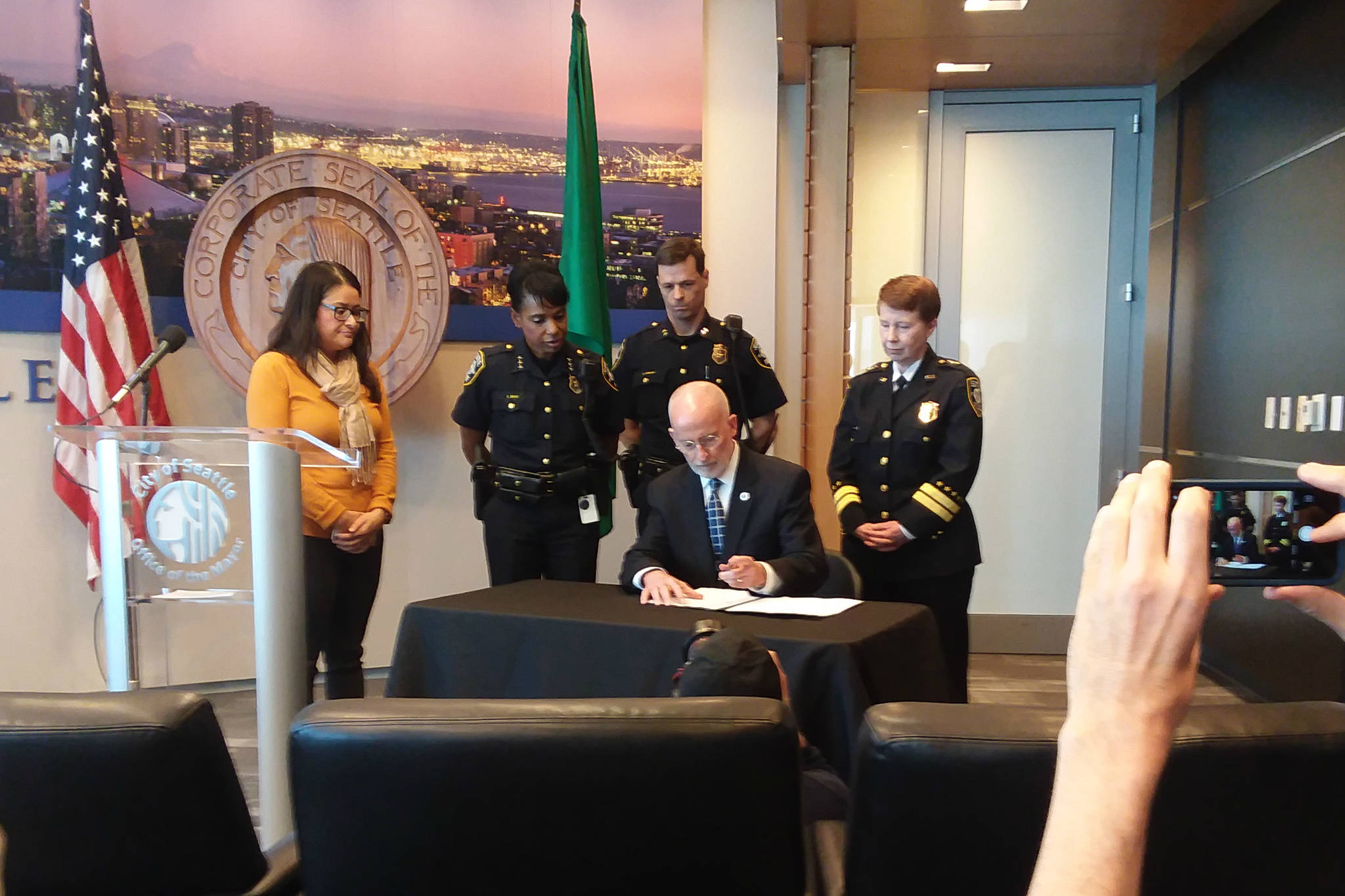Seattle Mayor Tim Burgess signed an executive order Wednesday afternoon limiting extra work by Seattle police officers for third-party employers, following news of potential corruption among moonlighting officers. The order immediately requires those rent-an-actual-cop services to begin working through the Department rather than deciding on work assignments independently, and it assigns a task force to issuing further recommendations for regulating secondary employment before the end of Burgess’ term in November.
“We will not let the private interests of a few police officers tarnish our entire police department,” said Burgess after signing the order. In addition to potentially overworking police officers, he said, an unregulated secondary employment system for police creates potential liability for the city whenever sworn officers exercise police power in their capacity as private employees. The order does not eliminate moonlighting for Seattle police officers. These new rules, Burgess said “should have happened earlier, and as a councilmember maybe I should have done more.
“But I wasn’t mayor,” he said, “and now I am, and we’re acting.”
The order comes after The Seattle Times revealed the FBI was “investigating allegations that Seattle police officers, with the help of the Seattle Police Officers’ Guild (SPOG), may have engaged in intimidation and price- fixing while working lucrative off-duty jobs directing traffic at parking garages and construction sites.”
“It is clear that we need a total overhaul of how this city handles the practice of police officers taking secondary jobs,” said Burgess in a pre-written statement. “Bringing the management of SPD secondary employment in-house is both in line with national best practices and consistent with recommendations from City Auditor, the Director of the Office of Police Accountability, and the federal monitor.”
The order does several things. First, it establishes “an internal [SPD] office, directed and staffed by civilians, to regulate and manage the secondary employment of its employees.” Second, it creates an interdepartmental task force to work in consultation with SPOG, the city attorney, the Community Police Commission, and a slew of other people and groups in order to recommend more permenant rules on moonlighting cops. The deadline for recommendations is November 14, not long before Burgess will be replaced by either Cary Moon or Jenny Durkan.
“The leadership of this City has expressed concerns regarding the secondary employment system for years,” said Councilmember M. Lorena González in a written statement. “I commend Mayor Burgess for his commitment to good governance that will promote accountability, and for his Executive Order that will help us resolve this long-standing issue once and for all.”
Burgess said he talked with SPOG about the executive order Wednesday morning, but didn’t want to speak on their behalf. Not long after Burgess signed the order, SPOG posted an unrelated Tweet alleging unfair labor practices by the city.
SPOG has gone 1000 days w/out a LABOR contract. DISGUSTING! City follow CBA/Labor Law! @SeattleCouncil @OfficeofMayor pic.twitter.com/C35IqnI8L0
— SPOG (@SPOG1952) September 27, 2017
Later, SPOG said in a written statement that it will “be taking legal action on this order,” which the union says is a circumvention of state law governing collective bargaining agreements.
“Officers have worked secondary jobs for decades as a means to supplementing their income,” read the statement in part.
“Current SPD Policy states that Officers are required to have an off duty work permit for each and every secondary job they work…Why the need for another Executive Order? If there are changes sought by the City, why can’t those changes be accomplished at the bargaining table? This is yet another example of the City violating the Collective Bargaining Agreement (CBA) and State Labor Law. SPOG ALWAYS follows the CBA and State Labor Law!!”
cjaywork@seattleweekly.com
This post has been updated.








